
 i_need_contribute
i_need_contribute

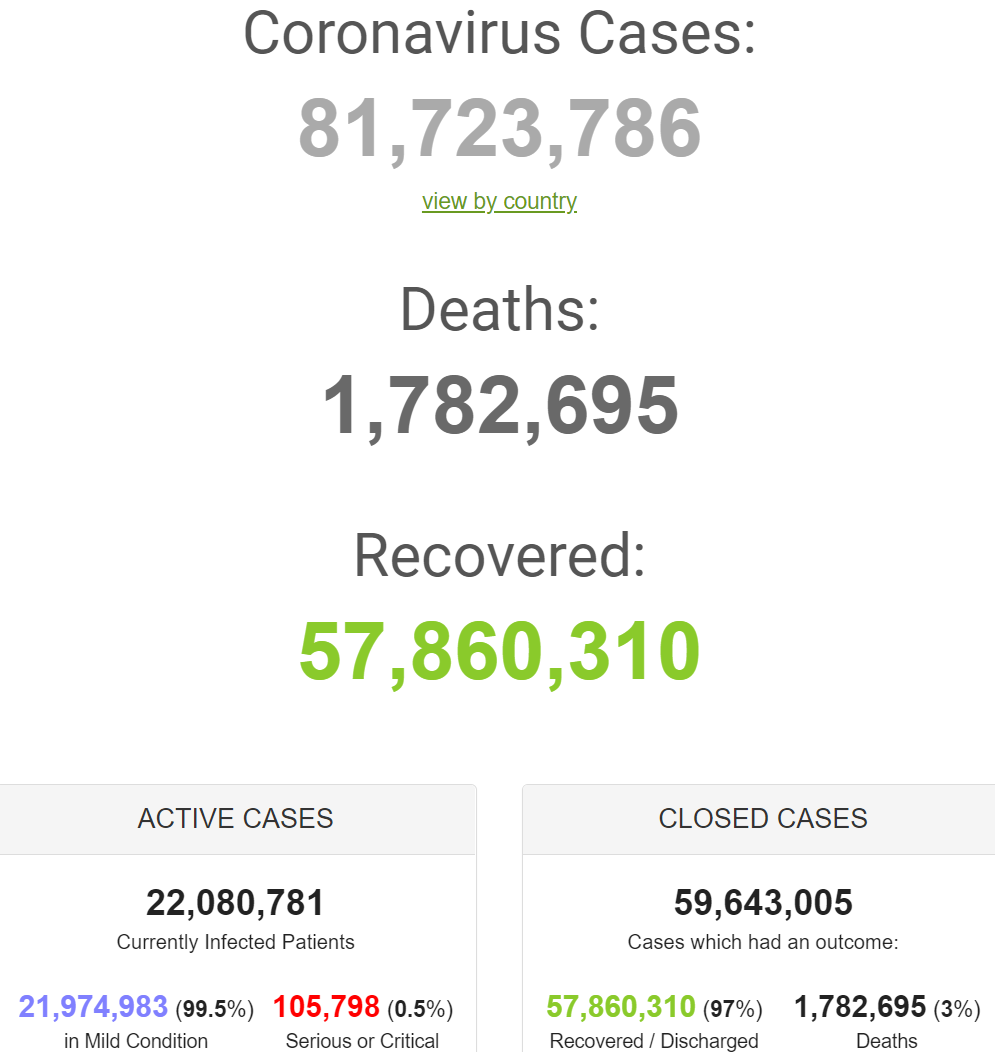
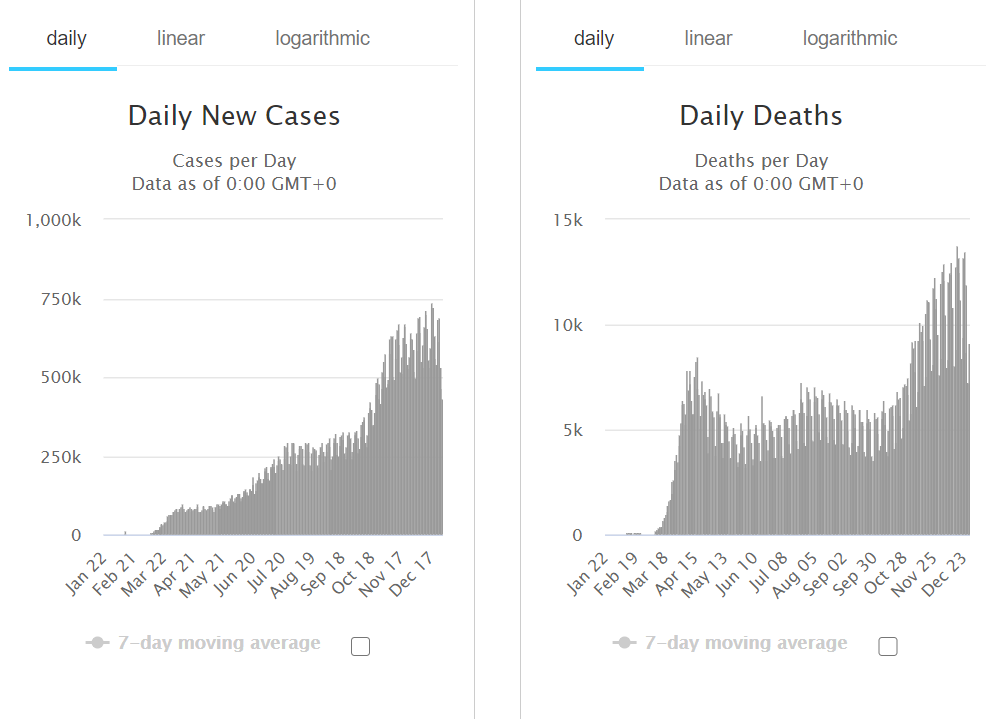
|
Country, |
Total |
New |
Total |
|
World |
81,661,829 |
+487,404 |
1,781,054 |
|
19,781,718 |
+186,391 |
343,182 |
|
|
10,224,797 |
+16,072 |
148,190 |
|
|
7,506,890 |
+22,605 |
191,641 |
|
|
3,078,035 |
+27,787 |
55,265 |
|
|
2,562,646 |
+2,960 |
63,109 |
|
|
2,329,730 |
+41,385 |
71,109 |
|
|
2,162,775 |
+15,197 |
20,135 |
|
|
2,056,277 |
+8,585 |
72,370 |
|
|
1,894,072 |
+8,134 |
50,122 |
|
|
1,670,194 |
+14,872 |
31,176 |
|
|
1,603,807 |
+9,310 |
42,374 |
|
|
1,590,513 |
+7,216 |
42,868 |
|
|
1,383,434 |
+6,217 |
122,426 |
|
|
1,261,010 |
+3,211 |
27,147 |
|
|
1,206,373 |
+5,908 |
54,814 |
|
|
1,030,374 |
+4,385 |
17,849 |
|
|
1,011,871 |
+7,458 |
27,071 |
|
|
1,008,908 |
+1,251 |
37,525 |
|
|
770,400 |
+7,415 |
11,042 |
|
|
719,219 |
+5,854 |
21,452 |
|
|
674,391 |
+3,768 |
11,241 |
|
|
638,877 |
+847 |
19,200 |
|
|
618,429 |
+2,620 |
15,334 |
|
|
602,028 |
+1,923 |
16,443 |
|
|
592,528 |
+931 |
12,791 |
|
|
555,207 |
+3,187 |
15,121 |
|
|
510,080 |
+932 |
7,479 |
|
|
473,309 |
+1,974 |
9,929 |
|
|
470,650 |
+766 |
9,124 |
|
|
433,029 |
+950 |
7,272 |
|
|
407,285 |
+5,815 |
3,256 |
|
|
396,666 |
+2,093 |
6,677 |
|
|
362,339 |
+119 |
6,196 |
|
|
353,484 |
+1,592 |
5,931 |
|
|
328,619 |
+2,559 |
3,073 |
|
|
316,669 |
+609 |
9,161 |
|
|
289,748 |
+1,802 |
3,778 |
|
|
258,840 |
+659 |
1,832 |
|
|
233,705 |
+2,348 |
3,892 |
|
|
222,143 |
+538 |
2,418 |
|
|
220,236 |
+2,924 |
3,252 |
|
|
215,483 |
+772 |
2,538 |
|
|
209,758 |
+403 |
13,994 |
|
|
205,246 |
+316 |
3,739 |
|
|
202,863 |
+1,027 |
660 |
|
|
198,053 |
+337 |
7,251 |
|
|
188,588 |
+1,841 |
1,394 |
|
|
172,820 |
+1,594 |
1,409 |
|
|
168,092 |
+569 |
1,879 |
|
|
Dominican |
167,405 |
+641 |
2,404 |
|
165,762 |
+558 |
2,144 |
|
|
157,948 |
+114 |
2,775 |
|
|
155,826 |
+2,479 |
1,204 |
|
|
154,843 |
+494 |
9,098 |
|
|
152,460 |
+733 |
2,196 |
|
|
149,857 |
+204 |
932 |
|
|
143,222 |
+160 |
244 |
|
|
141,924 |
+569 |
2,909 |
|
|
135,931 |
+475 |
4,672 |
|
|
135,441 |
+132 |
4,773 |
|
|
134,310 |
+1,217 |
1,332 |
|
|
133,900 |
+1,359 |
7,466 |
|
|
133,204 |
+1,612 |
4,518 |
|
|
132,369 |
+1,773 |
1,269 |
|
|
128,563 |
+91 |
1,495 |
|
|
123,145 |
+281 |
1,912 |
|
|
122,534 |
+648 |
2,618 |
|
|
119,713 |
+616 |
3,066 |
|
|
115,327 |
+521 |
2,595 |
|
|
112,636 |
+320 |
1,018 |
|
|
106,690 |
+1,594 |
455 |
|
|
105,374 |
+952 |
2,202 |
|
|
98,913 |
+532 |
1,440 |
|
|
98,631 |
+382 |
2,737 |
|
|
95,992 |
+69 |
1,664 |
|
|
91,935 |
+202 |
351 |
|
|
86,976 |
+21 |
4,634 |
|
|
86,894 |
+765 |
2,205 |
|
|
84,811 |
+397 |
1,264 |
|
|
81,804 |
+83 |
2,456 |
|
|
80,535 |
+162 |
1,349 |
|
|
76,832 |
+81 |
613 |
|
|
58,529 |
+5 |
29 |
|
|
57,680 |
+808 |
819 |
|
|
56,572 |
+318 |
1,164 |
|
|
54,503 |
+102 |
333 |
|
|
47,585 |
+526 |
429 |
|
|
46,969 |
+275 |
675 |
|
|
45,849 |
+19 |
487 |
|
|
45,415 |
+258 |
1,313 |
|
|
6,285 |
+144 |
60 |
|
|
6,013 |
+35 |
120 |
|
|
5,323 |
+18 |
49 |
|
|
1,451 |
+10 |
35 |
Retrieved from: https://www.worldometers.info/coronavirus/
From CNN's Swati Gupta in New Delhi
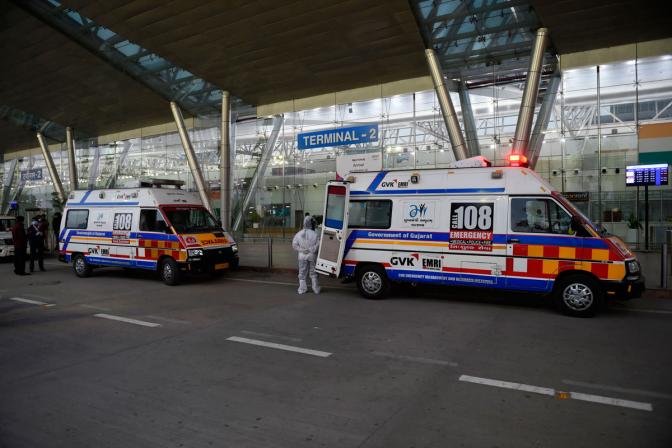
A health worker stands beside ambulances parked outside the Sardar Vallabhbhai Patel International Airport, in Ahmedabad, India, upon the arrival of passengers from the UK on December 22. Sam Panthaky/AFP/Getty Images
India announced Tuesday morning that it has detected the new Covid-19 variant in six passengers who have returned from the United Kingdom, according to the Ministry of Health and Family Welfare.
All six patients have been isolated and anyone who came in contact with them is currently under quarantine.
“All these persons have been kept in single room isolation in designated health care facilities by respective state governments,” the health ministry said in a news release.
"Their close contacts have also been put under quarantine. Comprehensive contact tracing has been initiated for co-travellers, family contacts and others. Genome sequencing on other specimens is going on.
Last week, the Indian government suspended all flights to and from the UK till the end of December.
State and Federal authorities have been tracking about 33,000 passengers who traveled to India from the UK between November 25 and December 22. Of those, 114 have tested positive for Covid-19. Samples from all positive patients are being genome sequenced for variants.
From CNN’s Junko Ogura in Tokyo
Japan’s Health Ministry announced on Monday that it had detected the country's first case of the South African Covid-19 variant.
A woman in her 30s who arrived at Tokyo’s Narita airport from South Africa on December 19 tested positive for Covid-19 and was found to be carrying the variant.
The government also on Monday confirmed an additional six cases of the English variant, which appears to transmit more easily.
Those cases traveled from the United Kingdom and tested positive at the airport upon their arrival in Japan between December 1 and 24. A total of 14 cases of the UK variant have now been detected in Japan.
The announcement of the detection of the South Africa-linked variant comes after the Japanese government started banning the entry of non-resident foreign nationals on Monday following the discovery of the UK variant in Japan.
From CNN's Julia Hollingsworth
When China first reported cases of coronavirus to the World Health Organization on December 31, 2019, it was described as a mysterious new strain of pneumonia. It didn't even have a name.
Within two weeks, Chinese scientists had identified the virus' genome sequence, the genetic code that makes up the virus. Within three weeks, the first test kits had been created and then shared by the WHO. And just over 11 months since the virus was reported to the WHO, the first people were vaccinated, making the shots the fastest vaccines ever developed.
The speed at which we've learned about coronavirus is unprecedented and scientists say we already know a remarkable amount.
But one year on, with more than 81 million reported infections and 1.7 million deaths around the world, there's still a lot we don't know about Covid-19.
Those unknowns range from the basics -- such as how the virus started -- to the more complicated questions, including how will this pandemic end?
Retrieved from: https://edition.cnn.com/world/live-news/coronavirus-pandemic-vaccine-updates-12-29-20/index.html
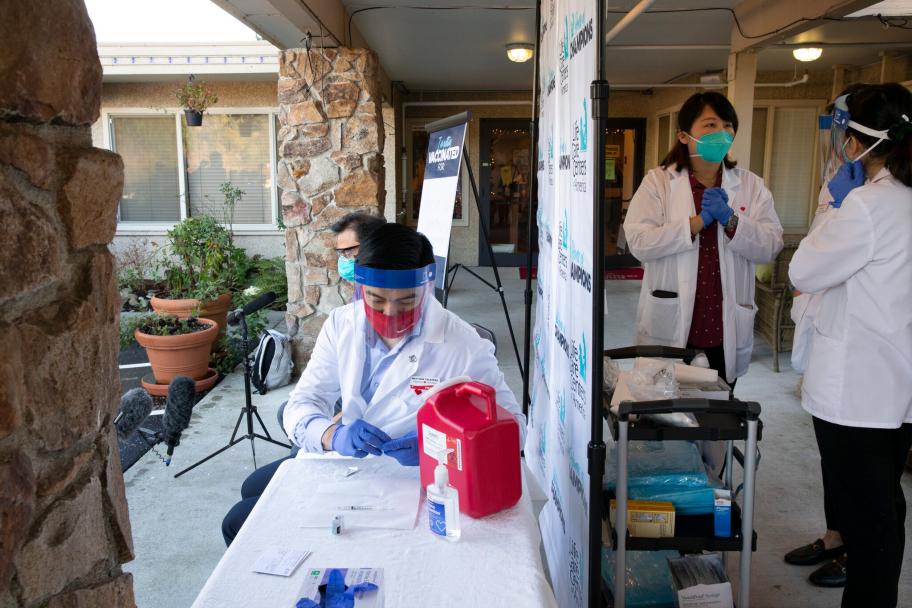
The Life Care Center of Kirkland, a nursing home near Seattle, was the site of the first U.S. coronavirus outbreak. Residents and staff members received vaccinations on Monday.Credit...Karen Ducey/Getty Images
A nurse at the suburban Seattle nursing home that was ravaged by the first U.S. cluster of coronavirus cases sat down beside a visiting pharmacist on Monday, pulled up her blue shirtsleeve and received the first dose of the Covid-19 vaccine administered at the facility.
It was the beginning of what residents, families and employees hope will be a turning point in a pandemic that has killed tens of thousands of people in long-term care facilities. Vaccination teams from Walgreens and CVS were fanning out to facilities across the country on Monday, the start of a long, difficult campaign to vaccinate some of the country’s most vulnerable people.
At the facility near Seattle, the Life Care Center of Kirkland, which is connected with 46 coronavirus deaths, relatives of residents got a text message on Monday morning alerting them that vaccinations were beginning.
Colleen Mallory had been waiting for this moment. Her mother has severe dementia, and since Life Care was locked down last winter, her family has visited her mostly by standing outside her window, waving and saying “I love you.”
Ms. Mallory’s family gave Life Care permission to vaccinate her mother, and Ms. Mallory said she had been calling and calling, anxious to know whether it had actually happened. “I can’t get ahold of anyone,” she said. “It would be nice to know.”
Alice Cortez, the first nurse vaccinated at the facility, said she felt “a new life, a new beginning, but a better life,” The Seattle Times reported. There were roses and cheers as she was injected just outside the facility, with cameras rolling.
The scene was starkly different last winter, when the quiet, shaded nursing home became a scene of grim vigil and daily updates about deaths and case counts. Journalists crowded outside the locked-down facility as ambulances whisked residents to the hospital and families peered through windows to check on parents and grandparents.
Life Care officials did not immediately reply to inquiries about how many staff members and residents were vaccinated on Monday, or how long it would take to vaccinate them all.
Retrieved from: https://www.nytimes.com/2020/12/28/us/vaccinations-begin-at-the-nursing-home-where-46-died-in-the-pandemics-first-days.html
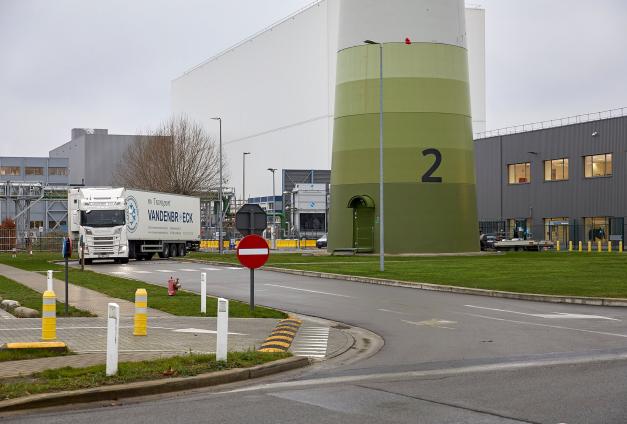
Pfizer factory in Puurs, Belgium, this month. The vaccine delivered from there has to be kept at minus 70 degrees Celsius.Credit...Ksenia Kuleshova for The New York Times
The delivery of a small number of vaccine doses from Pfizer to several countries in the European Union suffered a minor delay after concerns about the temperature controls being used to keep the doses super cold. The issue forced shipments from a factory in Belgium to be pushed back a day, according to the Spanish health authorities.
Pfizer’s factory in Puurs, Belgium, told the company’s Spanish division on Monday night that shipments to eight European countries would be delayed “because of a problem in the process of loading and sending,” the Spanish ministry said in a news release.
The release did not specify which countries beside Spain were affected. When asked about the delay on the Spanish radio broadcaster Ser, Salvador Illa, the health minister, said that the problem was linked to the “control of the temperature” of the shipments and had been resolved.
The doses, he said, should arrive on Tuesday, one day late.
A Pfizer spokeswoman, however, said that while there was a “minor logistical issue,” there were “no manufacturing or temperature control issues to report.”
The delay underscored the logistical challenges of speeding millions of doses of vaccine that need to be kept at minus 70 degrees Celsius around the world as fast as possible.
On Sunday, the first day of the vaccination campaign in Europe, there was also a minor problem with the cold-chain process in Germany: Concerns about 1,000 shots not being cold enough delayed efforts around Lichtenfels, in Bavaria.
“When reading the temperature loggers that were enclosed in the cool boxes, doubts arose about the compliance with the cold chain requirements,” the district of Lichtenfels said in a statement.
Nicola Davis Science correspondent Tue 29 Dec 2020 06.00 GMT
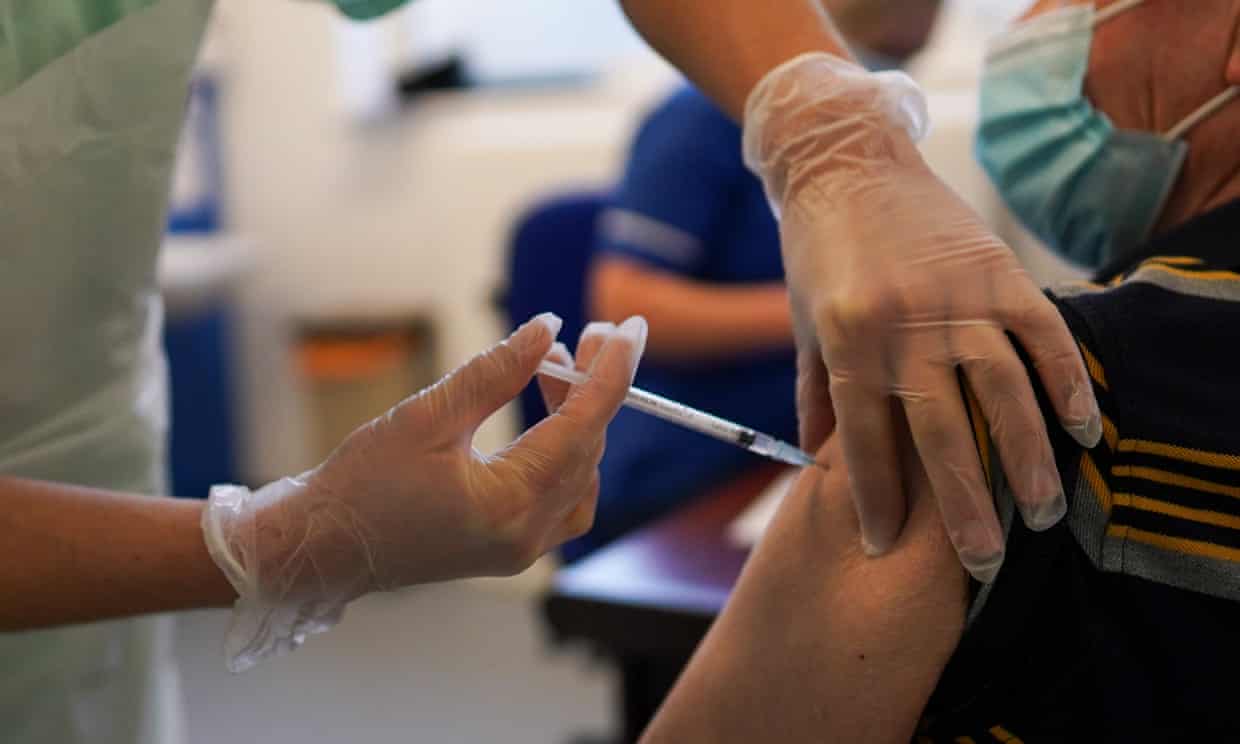
Few people who have been offered the vaccine so far have refused to have the jab. Photograph: Ian Forsyth/Getty Images
Uptake of the Covid-19 vaccine has been high among those offered it, doctors say, despite fears that vaccine hesitancy could undermine efforts to control the pandemic.
Experts have feared mass uptake of the jab could be jeopardised by widespread misinformation, concerns among the public about the speed at which the vaccine has been developed and approved, and lack of trust in vaccines and the pharmaceutical companies and governments calling for it.
Such concerns have been compounded by the new, highly transmissible variant of coronavirus that is spreading across the UK, which will mean a greater proportion of the population needs to be vaccinated to achieve herd immunity.
But for now, at least, it seems few are shying away from vaccination. “We’ve had reports from our members that despite inevitable teething problems – to be expected when delivering a completely new and complicated vaccine at scale and speed – the programme seems to be running well overall with very positive take-up rates, so far,” said Prof Martin Marshall, chair of the Royal College of GPs and a practising GP in east London.
Dr Julia Patterson, founder and chief executive of EveryDoctor, a network of grassroots NHS medics, agreed. “I run a network of 26,000 doctors. The response so far has been overwhelmingly positive among those receiving the vaccine. Despite much disinformation online, the uptake is going well,” she told the Guardian.
According to UK government figures, 616,933 people had received their first dose of the Pfizer/BioNTech Covid vaccine by the week ending 20 December, with those over the age of 80, residents and workers of care homes and NHS staff the first groups to receive the shot.
Dr Fari Ahmad, a GP, said a lot of elderly recipients are very happy to have the vaccine.
“I think they do understand how much of a difference it will make to them individually and they’re probably the ones that have been shielding, and it’s had a massive impact on them,” she told BBC Breakfast.
“As we move through the age ranges I certainly think there will be some vaccine hesitancy, but I would hope that people will have seen the benefits of it.”
Dr Samantha Vanderslott, of the Oxford Vaccine Group, said that surveys have previously suggested acceptance of a Covid vaccine would be higher among older age groups.
A poll by YouGov in November showed that 67% of Britons were very likely, or fairly likely, to take the Pfizer/BioNTech vaccine if offered, a figure that rose to 81% among those aged 65 and over.
“The acceptance in older ages has been higher in surveys and vaccination seems to have been going quite smoothly,” said Vanderslott. “How younger people will fare is a bit unknown but they will be far down the list and millions will have had the vaccine already, so the hope is that the worries about the newness and speed of development will decrease.”
But Vanderslott added that more effort is needed to underscore the importance of vaccination in younger people, and offer clear and tailored messages to groups with particular conditions or situations.
Prof Beate Kampmann, director of the vaccine centre at the London School of Hygiene & Tropical Medicine agreed that as the number of those who have been vaccinated grows, many of those wavering may decide to have the jab.
But, she added, other factors may also play a role. “If there are going to be travel restrictions and people can’t go anywhere unless they have got this vaccine passport [if that approach is taken], I think people will change their mind quite quickly about whether they want this vaccine or not.”
Retrieved from: https://www.theguardian.com/society/2020/dec/29/covid-vaccine-uptake-high-despite-concerns-over-hesitancy
Russia has recorded 20.5% more deaths since the pandemic began in the country in April, data from the Rosstat state statistics service, tallied by Reuters, has shown.
The total figure, at 241,193 more deaths in April-November 2020 than during the same period the previous year, is significantly higher than the preliminary pandemic death toll of 55,265 so far, reported on a cumulative daily basis by the government’s coronavirus crisis centre. This figure includes deaths recorded in December.
Though death tolls fluctuate year-to-year, tallies of what are referred to as excess deaths can illustrate the impact of the pandemic by including cases where the virus was not a confirmed cause of death, as well as deaths from other causes that could be linked to the fact that national medical systems are overstretched.
Rosstat data, tallied by Reuters, showed that less than half the total number of such excess deaths – at 116,030 since the start of the pandemic in Russia in April – can be attributed directly to the pandemic.
This is still more than double the preliminary death toll figure from the government coronavirus crisis centre, which is overseen by the health ministry and the consumer safety watchdog Rospotrebnadzor.
Rosstat shared new data on Monday about the total number of deaths reported in Russia in November.
The data showed the number of deaths was 55.6% higher than in the same month last year, 219,872 more deaths in total. Of these, the statistics service said, 35,645 deaths were directly related to the pandemic.
Earlier this month, the service reported the number of deaths in October, which indicated deaths were up 30.3% on the same month the previous year.
Here are the key developments – and UK flight bans – from the last few hours:
· The UK reported its worst daily figure for new infections since the pandemic began. Health authorities said there were 41,385 new positive tests. The previous highest number was 39,237, reported on 23 December.
· South Africa has tightened restrictions. The president Cyril Ramaphosa banned alcohol sales and extended a nationwide curfew, as infections passed the one million mark owing to a faster-spreading variant of the disease discovered in the country.
· The French health ministry reported 2,960 new infections; down from 8,822 on Sunday and from Saturday’s 3,093. The French president, Emmanuel Macron, planned to review the situation on Wednesday amid fears of a third lockdown.
· The new variant of the virus was detected in Finland. The country imposed travel restrictions earlier this month on passengers from the UK amid concerns over the new variant, which is thought to be more contagious than previous ones.
· A former Japanese minister died of Covid-19, his party said. Yuichiro Hata, who was transport minister in 2012 and is the son of the former prime minister Tsutomu Hatawho, became the first incumbent lawmaker to succumb to the disease in a nation scrambling to shut its doors to foreign travellers.
· The Catalan regional government stopped short of threats to introduce more severe restrictions. That came despite 973 new cases and 26 deaths in the past 24 hours and a growing risk of a fresh outbreak.